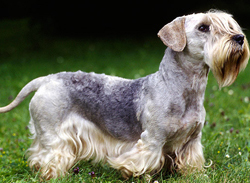Cesky Terriers are well-muscled dogs with long, silky coats. Although puppies are both black or black and tan, the coat color of adults comes in shades of gray ranging from charcoal to platinum. These short-legged dogs have triangular, drop ears, dark noses, and wedge-shaped heads. Their eyes are medium and almond-shaped and their faces are bearded. Cesky Terriers measure 10 to 13 inches tall at the shoulder and weigh 16 to 22 pounds.
This breed loves to dig and may develop the bad habit of food stealing. Training can help with these negative behaviors.
Because these dogs are so active and have a loud bark, they do best in homes with a backyard where they can run and play. They are very loyal to their family and love spending time accompanying their humans on walks and hikes.
In their native Czech Republic, Cesky Terriers are featured all over, including on television and postage stamps and in books and movies.
Loyal and good-natured dogs, Cesky Terriers make good family pets. They are non-aggressive, but can be reserved toward strangers. This breed is known for being less excitable than other terriers, which is often a strong selling point and reason for adoption or purchase.
Cesky Terriers are energetic and active, usually too much so to be a good lap dog. Anyone interested in a calm dog to cuddle with should look elsewhere. These dogs enjoy playing fetch with their human family members and like long walks. They excel at rally, agility, tracking, and other dog sports, and they benefit from frequent time outdoors in a securely fenced yard.
If left along for long periods, these dogs can become unhappy and destructive. Providing them with plenty of companionship and a variety of stimulating toys can help. However, this breed has a knack for destroying toys and the collection may need to be replaced frequently.
Cesky Terriers are a very healthy breed with little risk of genetic disorders. These dogs do have a tendency to develop lens luxation, however, and their eyes should be checked annually for symptoms of the condition.
Due to their bad habit of stealing food and eating until their bellies are over full, Cesky Terriers are prone to obesity. Because being overweight or obese significantly increases the risk of diabetes, heart disease, arthritis, certain cancers, and other conditions in dogs, monitoring the weight of these dogs is essential to their health. Encouraging regular exercise, limiting treats and table food, and securing dog food inside locked cabinets can help control the weight of this breed.
Proper nutrition, weight management, timely vaccinations, and routine veterinary care help ensure Cesky Terriers live a long and active life.
Intelligent and independent-minded, Cesky Terriers need training and early socialization to ensure they get along well with humans and other animals. They benefit greatly from continued socialization throughout life, especially if they are ever around strangers.
Cesky Terriers have a very short attention span, which makes it extremely important to keep training sessions short and interesting. These dogs respond best to positive reinforcement, especially play and food rewards, and they do not respond well to harsh criticism or forceful training methods.
This breed loves to dig and may develop the bad habit of food stealing. Training can help with these negative behaviors. Additionally, Cesky Terriers will run loose or chase and kill small animals if not kept in a securely fenced yard. Keeping them contained is also important to prevent these energetic and impulsive dogs from running into traffic. They should always be on a leash when on walks.
Although Cesky puppies need daily grooming, adult dogs require brushing only two or three times per week. Monthly trimmings are recommended, and these can be done professionally or at home. Other than this, the coat is very low maintenance and requires very little care.
These dogs only need bathing when the coat becomes sticky or stinky or to remove harmful substances from the hair. However, the beard may need cleaning and drying after eating and drinking, as it tends to fall into food and water bowls.
Cesky Terriers should have their nails clipped every few weeks, or as needed, to prevent snagging, and the ears should be checked weekly for odor, redness, and other signs of infection. Excess earwax should be removed by a veterinarian, and the outer ears should be cleaned every 7 to 10 days with a cotton ball and a canine otic ear cleanser. Brushing the teeth regularly is also important and will improve breath smell and prevent dental disease.
Cesky Terriers originated in the Czech Republic and the breed is considered one of the country's national breeds. These dogs have been used to hunt rabbits, fox, ducks, pheasants, and larger game, such as wild boar.
The breed originated when a hunter named Frantisik Horak wanted to create a terrier that was suitable for pack hunting in the forests of Bohemia. To this end, he bred a Scottish Terrier and a Sealyham Terrier, and the result was the Cesky Terrier. The Scottish Terrier, named Donka Lovuzdar, was a hunter and a confirmation show dog, and the Sealyham, named Buganier Urquelle, had superior hunting skills.
Cesky Terriers arrived in the United States in the 1980s. This breed is one of the newest in America and one of the most recently recognized by the AKC.
The American Kennel Club officially recognized the Cesky Terrier in 2011.

